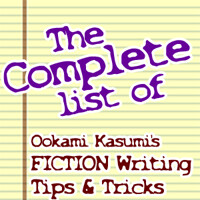
Original Message
Characters have to have flaws, but sometimes it's a bit hard to add those flaws in.
-- Concerned About Characters
Where do you put a Character's Flaws?I like to show a character's greatest strength / greatest weakness (normally both are one and the same,) in the first scene that character occupies.
Scene One: If the opening scene features the main character, I show that character In Action showing off their greatest strength and a small portion of that strength's crippling Weakness -- without exposing that it's a weakness.
In The Hobbit:
-- Bilbo Baggins's greatest Flaw is that's he's 'nice' and 'polite'. In other words, he has Good Character. Not something one would generally think of as being flaws.
Scene Two: As the story progresses that strength (and their dependence on it,) devolves openly into a crippling weakness that nearly destroys what's most important to them.
In The Hobbit:
-- Bilbo Baggins's Good Character is what allows Gandalf and 13 dwarves to take advantage of his home to get a free dinner, and his person. He is quite literally managed into signing a contract to go on an Adventure -- something Hobbits do not do. Later in the story, Bilbo Baggins's flaw of Good Character nearly gets him eaten by trolls because he's too polite to attack them.
Scene Three: At the center of the story The Worst Thing That Could Possibly Happen occurs. The character becomes utterly helpless and sunk deep in depression. That Weakness is what they must overcome and find a new source of strength to proceed.
In The Hobbit:
-- At the center of the story, Bilbo falls into a deep, dark pit. Faced with the frightening Gollum, who tells him point-blank that he intends to Eat him, Bilbo once again is too polite --he refuses to use his sword to protect himself. What saves him is a single moment of Bad Character; Theft. He keeps a gold ring that he knows belongs to Gollum. This one act of Bad Character ends up being his salvation against Gollum because the ring is Magical.
Scene Four: Validation: when the Flaw proves to be an actual strength.
In The Hobbit:
-- The ring that Bilbo stole allows Bilbo to save the dwarves when they're attacked by Spiders, then again when the dwarves are captured by the wood elves, then Bilbo himself when he is faced with a fire-breathing dragon.
How to use this when Writing. Example: A Romance Story
-- The Main Character's greatest strength is he's The Perfect Gentleman; he knows exactly the right thing to do and say no matter the circumstances. The flaw that comes with this talent is that Everyone knows that he has this talent. (It's not like he can hide it.)
Scene One: MC interacts with 3 females; an office lady, his childhood playmate, and the girl he actually likes. To each of them he is The Perfect Gentleman; he says and does exactly the right thing each time.
Scene Two: He becomes the guy to go to when one's heart is broken because he always knows what to say to make a girl feel better. The guys envy him, and the girls adore him. During this time, he begins to court the girl he likes: flowers, gifts, dates... At the end of the scene, he finally gets up the courage to confess his love. She smiles and Refuses to take him seriously. Why? He's so good at saying and doing the right thing, the girl he likes can't believe in his sincerity because he ALWAYS says and does the right thing; he treats Every girl the same way.
Scene Three: He continues to pursue her, and confess his feelings, but the more he talks, the less she believes him. Even worse, none of the girls believe that he's even capable of having feelings for only one girl -- after all, he's the Perfect Gentleman to every girl he meets.
Scene Four: Deep in despair, he sees her one more time only this time he's unprepared and a total mess; his appearance has gone to crap from depression, he hasn't eaten, he hasn't slept. He weeps angry tears while shouting in anger that no one believes him. In short: He's not a gentleman at all. This time she believes him because for the first time she can see the man hiding under the mask of 'Perfect Gentleman'.
The End.
Category Story / Tutorials
Species Unspecified / Any
Size 120 x 120px
File Size 786 kB
Listed in Folders
^^^That last text box took over your page... oops^^^
I was about to say: I plan on having the main character in the story that I am crafting right now fall from a hero, to basically a major villain by the near-end of the story, because of the arrogance wrought by his near-limitless power. Only when he stops and sees what he has become, and what the main villain has manipulated him into doing will he give himself up to end the insurmountable terror that has raged across the land. Hooray for semi-stereotypical heroic sacrifice!
I was about to say: I plan on having the main character in the story that I am crafting right now fall from a hero, to basically a major villain by the near-end of the story, because of the arrogance wrought by his near-limitless power. Only when he stops and sees what he has become, and what the main villain has manipulated him into doing will he give himself up to end the insurmountable terror that has raged across the land. Hooray for semi-stereotypical heroic sacrifice!
I'd like to put my own spin on this--
The characters we read/watch and enjoy are not so much developed by their flaws as they are DEFINED by them. Without knowing or caring what it is that prevents them from advancing towards their goal, or from growing and learning, there's no real conflict. Even an external antagonist is reduced to a zero sum if the characters have no internal conflicts or something that cripples their status; in fact, as the most engaging and renowned pieces of media throughout history have proven time and time again, it's the characters with the largest flaws and most insurmountable personal obstacles that make for the most compelling story arcs.
The characters we read/watch and enjoy are not so much developed by their flaws as they are DEFINED by them. Without knowing or caring what it is that prevents them from advancing towards their goal, or from growing and learning, there's no real conflict. Even an external antagonist is reduced to a zero sum if the characters have no internal conflicts or something that cripples their status; in fact, as the most engaging and renowned pieces of media throughout history have proven time and time again, it's the characters with the largest flaws and most insurmountable personal obstacles that make for the most compelling story arcs.
The characters we read/watch and enjoy are not so much developed by their flaws as they are DEFINED by them.
The better characters anyway.
-- There are plenty of stories that barely bother defining their characters at all. Those tend to focus almost purely on purely external conflicts. Ian Flemming's James Bond for one.
The better characters anyway.
-- There are plenty of stories that barely bother defining their characters at all. Those tend to focus almost purely on purely external conflicts. Ian Flemming's James Bond for one.
I am currently trying the reverse in a story: A flaw that turns into a strength.
The character starts out as snarky, whiny and seeing himself as a cosmic chew toy - which he is, being the protagonist of a fantasy story (more precisesly a parody of the typical fantasy prince - there are so many that everyone considers him expendable - he is so far from the throne that he gets the most dangerous jobs.)
His charisma is in the negative digits - the first time he tries himself at a rousing speech his army deserts.
His inner change is from passive and fatalistic to active and an embodiment of spite.
No matter what happens, he trudges on, and makes it to hell and back on sheer acquired endurance.
Even his negative outlook is something he eventually draws strength from - he is so used to seeing things bleak that when the actual end of the world looms it no longer rattles him.
The character starts out as snarky, whiny and seeing himself as a cosmic chew toy - which he is, being the protagonist of a fantasy story (more precisesly a parody of the typical fantasy prince - there are so many that everyone considers him expendable - he is so far from the throne that he gets the most dangerous jobs.)
His charisma is in the negative digits - the first time he tries himself at a rousing speech his army deserts.
His inner change is from passive and fatalistic to active and an embodiment of spite.
No matter what happens, he trudges on, and makes it to hell and back on sheer acquired endurance.
Even his negative outlook is something he eventually draws strength from - he is so used to seeing things bleak that when the actual end of the world looms it no longer rattles him.

 FA+
FA+











Comments